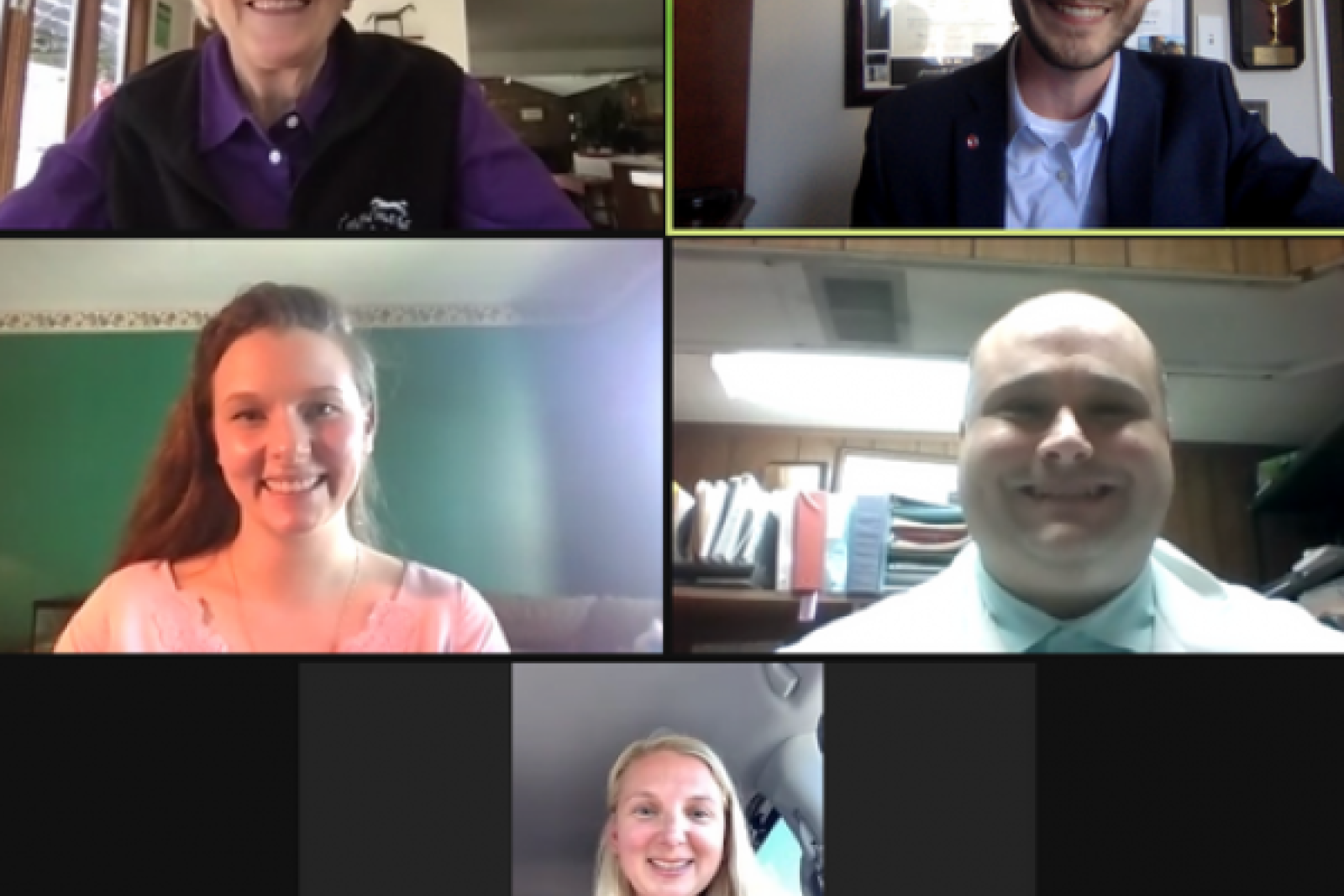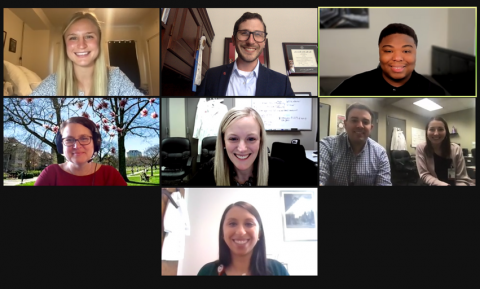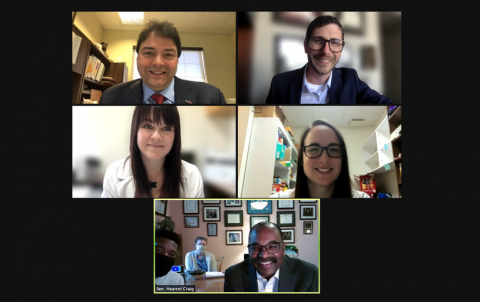Advocacy empowers students to drive legislative changes

As its second year wraps up, the Advanced Pharmacy Practice Experience (APPE) advocacy experience has continued to empower PharmD students at the College of Pharmacy to drive legislative changes on behalf of their community and their profession.
APPE rotations begin during a PharmD student’s final year in the program. Each rotation generally lasts four weeks and covers an aspect of pharmacy practice that students will need to know as they enter their career.
Pharmacy Advancement Fellow E. Michael Murphy, PharmD, leads the advocacy APPE experience, which enables students to build advocacy skills with state lawmakers. The experience helps students recognize how crucial legislation is to their profession and use their voice to advocate for change.
“We can be involved in the political and policy process more than every two to four years when it’s time to vote,” Dr. Murphy said. “This is something we can participate in every year, for the entire year, because policies on a federal and state level impact how we practice pharmacy and how our patients receive care.”
At the beginning of the academic year, Dr. Murphy, Jennifer Rodis, PharmD, BCPS, FAPhA, associate dean for Outreach and Engagement and the Experiential Education team, Julie Legg, PharmD, APhA and Katie Marks, identify the APPE rotation state legislator districts and the students with interest in pharmacy advocacy. The team prepares students to present to legislators about the pharmacy profession and the services they offer at their locations.
Students are given a manual that outlines key points for meeting legislators. In the weeks leading up to the visits, students schedule one-on-ones with Dr. Murphy to prepare for what their conferences should look like, how they should talk with the legislators and what to do if something unexpected happens.
“We go over thoughts on how to ensure that their message is getting across and how to put their best foot forward and showcase some of the great things at their rotation,” Dr. Murphy said.
Seizing opportunities during the pandemic
Dr. Murphy and his students found an opportunity during the pandemic that they didn’t have before. Legislators were more willing to meet with people in the health care industry and were more accessible than before. Students were able to host more legislators this previous year than they did in the first year. Dr. Murphy says this is because it’s much easier for legislators to fit a half hour Zoom meeting than an hour for travel and a half hour for a visit, allowing them to streamline virtual visits effectively.
Legislators wanted to hear students’ experiences working on the front lines with COVID-19, how they were managing and what the legislators could do to help. This gave students an opportunity to speak directly about legislation that would affect COVID-19 testing, treatment and access to care.
After some of the visits, legislators reached back out to students for more information about pharmacy services. Some of the legislators included that information in newsletters to their constituents. That College of Pharmacy students were able to educate their local legislators and show proof of advocacy in action.
Advocacy experience success
A $10,000 grant from the Ohio State Office of Outreach and Engagement allowed the team to expand the experience. It helped students secure 10 legislator visits over the past year. Many of the students spoke to elected officials about House Bill 6, which would increase COVID-19 vaccine access to patients across Ohio through pharmacists.
“Over a very short period of time, we saw this bill move very quickly through Ohio’s House of Representatives,” Dr. Murphy said. “It feels like a massive success that some of the visits we conducted were influential in that process.”
Following this success, Dr. Murphy is considering expanding the advocacy experience next year to include meetings with legislators on a national level.
Impact on students
Through this program, students take on a new mindset on how to participate in civic engagement. This mindset equips them with another way to care for their patients and advocate for their profession.
“I see advocacy as one of the greatest ways to influence patients' lives and health outcomes,” Sheriff Benson, PharmD ’21. said. “It sometimes feels futile, because it's an indirect method and takes a lot of time and persistence, but in the end, it's always worth the attempt.”
“This experience gave me the confidence and courage to continue to advocate and engage in discussions with legislators throughout my entire career,” said Julie Donahoe, PharmD ‘21. “Advocating for our profession goes hand in hand with advocating for our patients.”

“One story that will stick with me forever is a patient I had called who hadn't picked up her insulin in two weeks because she couldn’t afford it,” said Kelly Usakoski, PharmD ’21. “I called her doctor to find more affordable options, but I was frustrated with not being able to do more. This patient made it clear to me how important it is for pharmacists to be a part of the legislative process.”
Dr. Murphy says students are consistently surprised by how accessible and easy it is to advocate for their patients and their profession. It can be challenging to schedule and prepare for these meetings but at the end of the day, students report feeling empowered by being able to participate in civic engagement this way.

Dr. Murphy says students are consistently surprised by how accessible and easy it is to advocate for their patients and their profession. It can be challenging to schedule and prepare for these meetings but at the end of the day, students report feeling empowered by being able to participate in civic engagement this way.
“It can feel intimidating to think that these students have to talk to a legislator,” Dr. Murphy said. “These are people they see on the news and in newspapers, but they quickly realize that when they talk about things like pharmacy and health care, they are the experts in the room.”